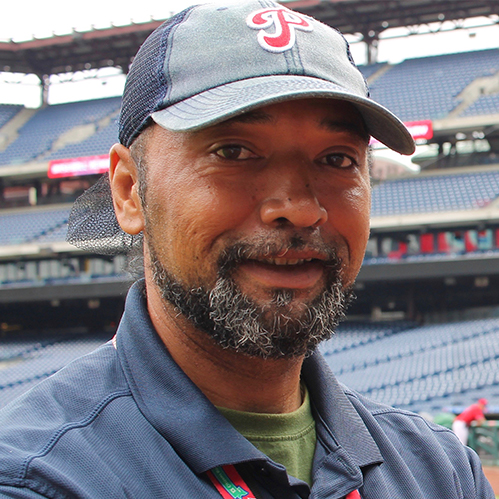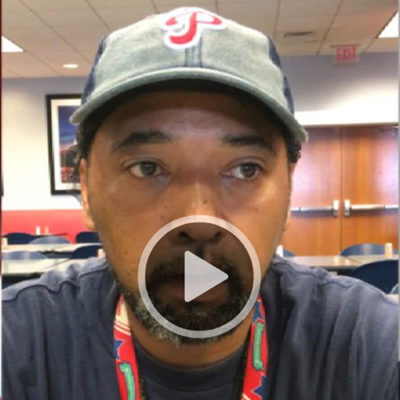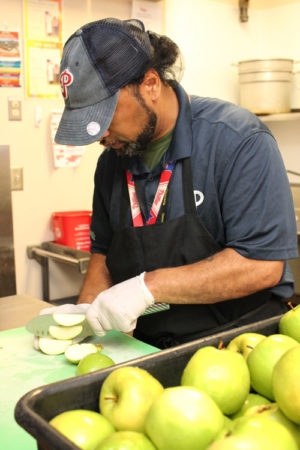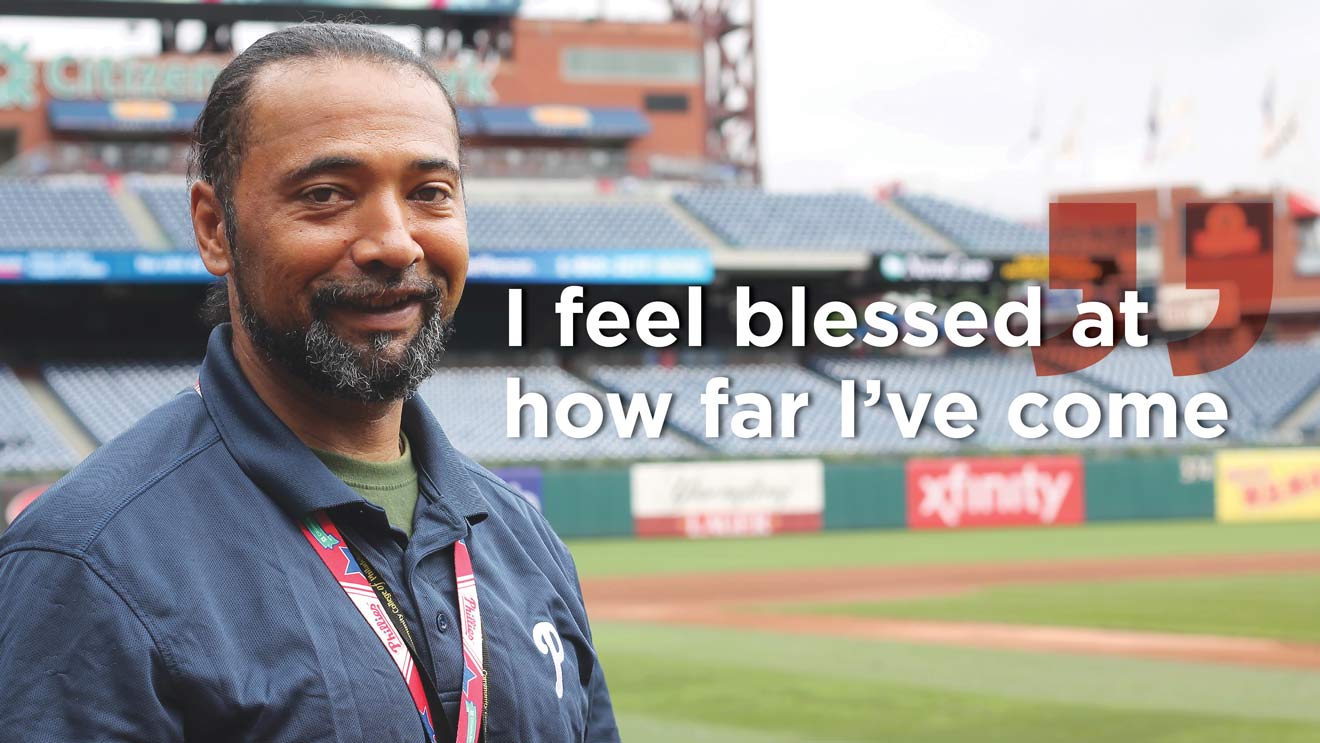
In the big leagues
Abraham took a deep breath and stepped gingerly onto the field at Citizen’s Bank Park, the home of the Philadelphia Phillies. A lifelong baseball fan who grew up dreaming of playing for the Phillies, Abraham had overcome homelessness with support from RHD’s FaSST/Connections program and his journey had taken him all the way here — to the infield dirt of a place he feels is hallowed ground.
The amazing thing for Abraham is, he works here now.
Abraham was living in a Philadelphia homeless shelter, working with FaSST/Connections, an RHD behavioral health care unit that provides evaluation, linkage, and coordination of services to individuals and families living in various shelters. FaSST/Connections resource coordinators work to provide advocacy, ongoing support, and empowerment to people working to break the cycle of homelessness.
The Phillies were coming to the shelter to serve a holiday dinner as part of the team’s community outreach in Philadelphia. That meal led to a chance meeting with the Phillies general manager, and an opportunity for Abraham.
“I feel blessed,” Abraham said. “I think of how long I was on the streets or in the shelters, and how I got there — all I try to do is make sure I don’t get back in that situation. I feel blessed at how far I came, because of the work I did. I got here because I did a lot of work, but I was also blessed with a lot of help.”

MLB.com follows Abraham's story
MLB.com followed Abraham’s story, with a nod to the work RHD’s FaSST/Connections did to help Abraham break the cycle of homelessness and take advantage of an opportunity with the Phillies: “Employee turns life around working for Phils.” Phillies GM Matt Klentak, who played such a pivotal role in this story, said: “There was something about Abraham that was really special.”
Abraham was looking forward to the Phillies’ visit; hopefully someone in the group at the shelter that day would be someone he could talk to about a job. But he didn’t have any idea how to go about it.
Abraham had experience as a dishwasher and prep cook, but hadn’t worked in more than a year. He got help from the staff at FaSST/Connections, who worked with him on his resume (“I had a piece of paper with a list of jobs on it,” Abraham said. “They helped me turn that into a professional resume”), coached him on what to say and encouraged him to go for it.
“I was nervous,” Abraham said. “I was very hesitant, but they were behind me.”
That Phillies group that day included General Manager Matt Klentak — himself hired just a month before. Abraham approached him at the shelter, introduced himself, handed Klentak a resume and said he’d greatly appreciate it if there was anything Klentak could do.
“What Abraham did was really brave,” said Christina Jordan, FaSST/Connections supervisor.
“January went by, and I didn’t hear anything,” Abraham said. “February went by, and I didn’t hear anything. I thought, well, maybe he didn’t even look it at. Maybe nothing was going to happen. Then (Kathy Killian, Phillies VP of Human Resources) came to see me. When I asked her why, she said Mr. Klentak just kept on bugging her about me.”
Klentak had taken Abraham’s resume to the Phillies HR department and asked them to take a look — if he could do the work. Abraham not only had the skill set, he quickly impressed everyone with his work ethic. He was hired as a dishwasher, but soon advanced to prep cook and is now a regular member of the kitchen staff.
“He’s doing a very good job,” said Rik Milton, the Phillies’ lead chef. “He really contributes — he’s learned how to use the forklift, so he can help out that way, too.

“He’s dedicated. All you have to do is tell him what to do and he jumps right on it. He does everything — he does the dishes, sweeps the floor, does prep work, he does whatever you ask him. His work ethic is really good.
“He’s doing the work to get himself on the right path, and we’re glad to be a part of that.”
In fact, when FaSST/Connections helped Abraham attain his own housing, people at the Phillies helped him outfit his new apartment, from kitchen supplies to a new TV.
“I’m glad I got this job,” Abraham said. “I’m amazed every time I come in, but when I get here it’s a job. I’m here to work. I jump right in.”
Are there some perks? Sure. Like the day Abraham got to meet Phillies legend Mike Schmidt.
“He’s the reason I first started liking baseball,” Abraham said. “I just said ‘hi.’ That was all I could say!”
And, almost every day, the Phillies general manager pokes his head in and checks on Abraham — saying hello and seeing how he’s doing.
With support from FaSST/Connections, Abraham has reunited with his son, is able to maintain his housing and picked up another job — he’s returned to Our Brother’s Place, the emergency shelter where this story began, to work as a chef in the kitchen there.
“Some people might have a hard time returning to the shelter to work, because it’s a place you might connect to a traumatic experience,” Jordan said. “But he was so positive through it, he was able to develop a sense of community there that allowed him to return.”
“The people at FaSST/Connections have helped me a lot,” Abraham said. “They helped me with housing, with getting this job, they helped me put my resume together, get back and forth to work, doctor’s appointments, money management. They keep me on my toes … they’ve been a big part of my help.”
Emily Mann, a resource coordinator at FaSST/Connections who works with Abraham, said she hopes other men in the shelter see Abraham as an example.
“He’s the sweetest person; he’s like a ray of sunshine,” Mann said. “Every day he comes in, he stops and talks to the guys he used to live with, and tries to encourage them. He’s definitely a role model for people.”



